必修2 unit1[上学期]
图片预览
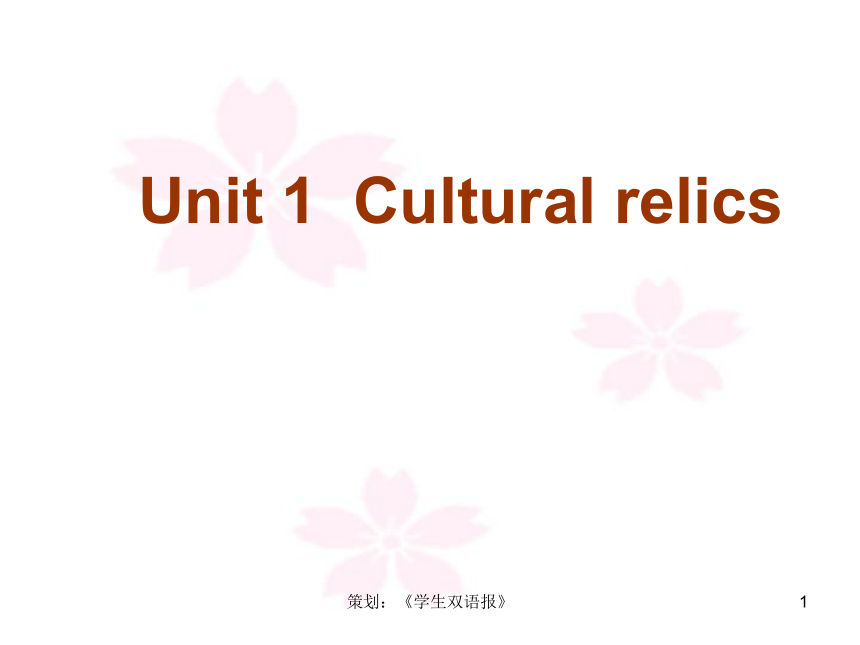

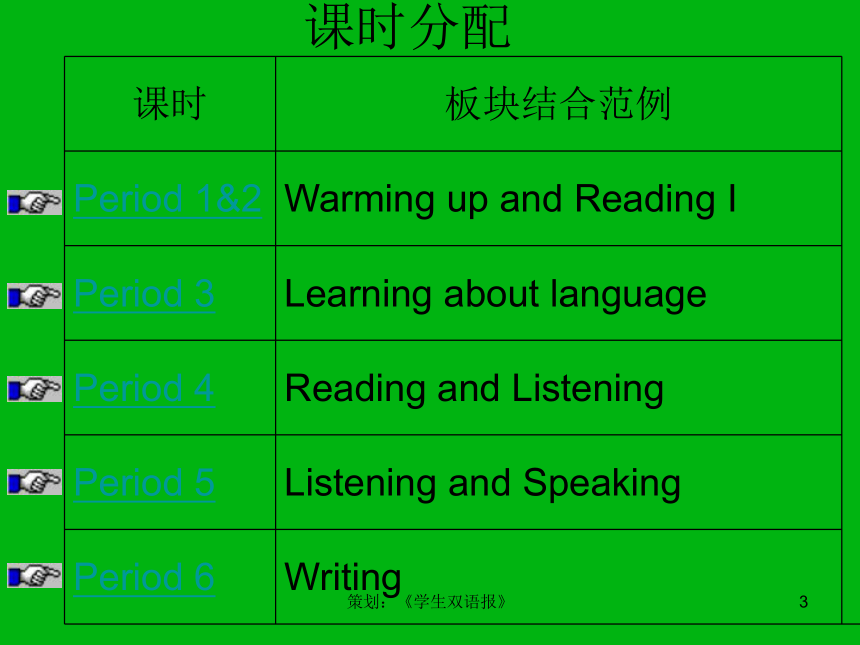

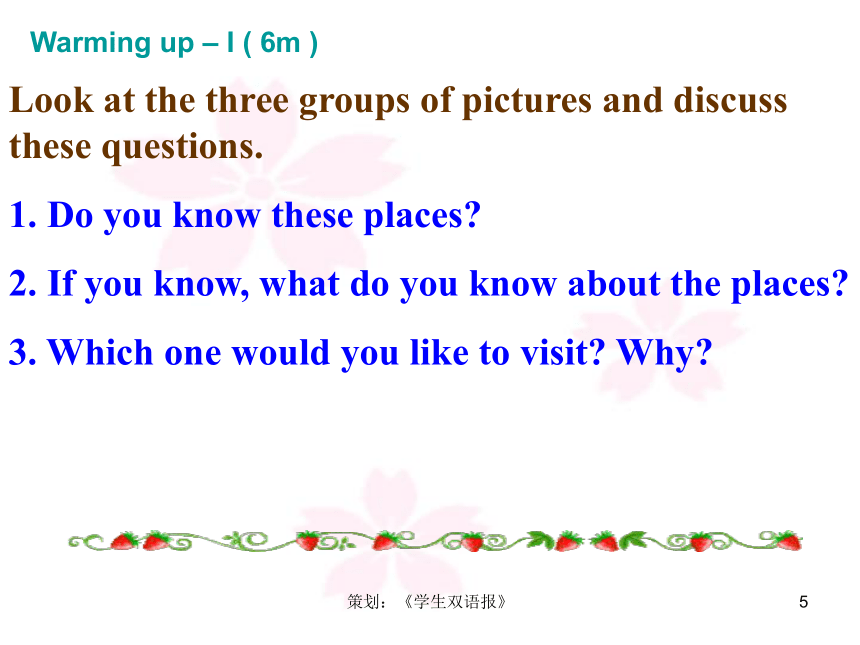
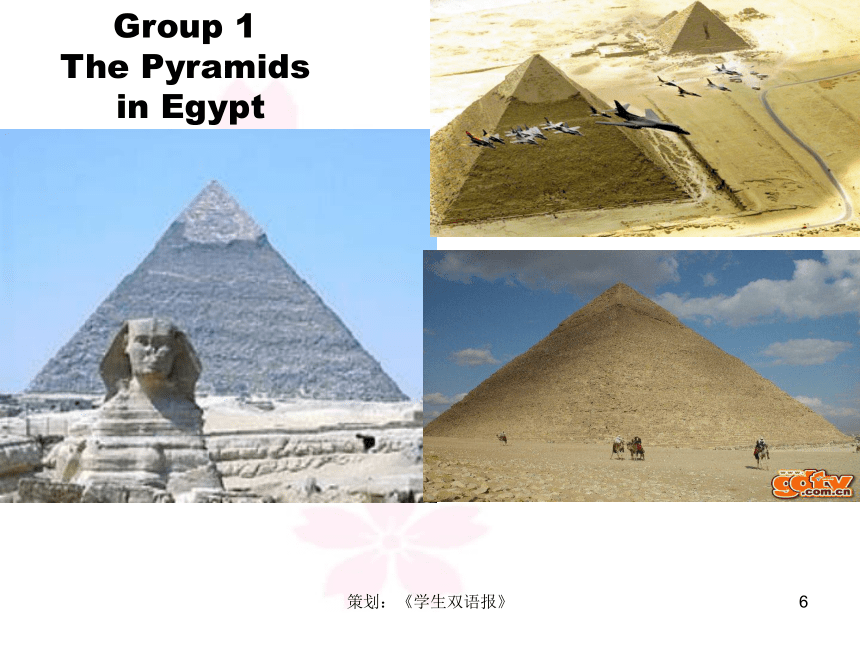

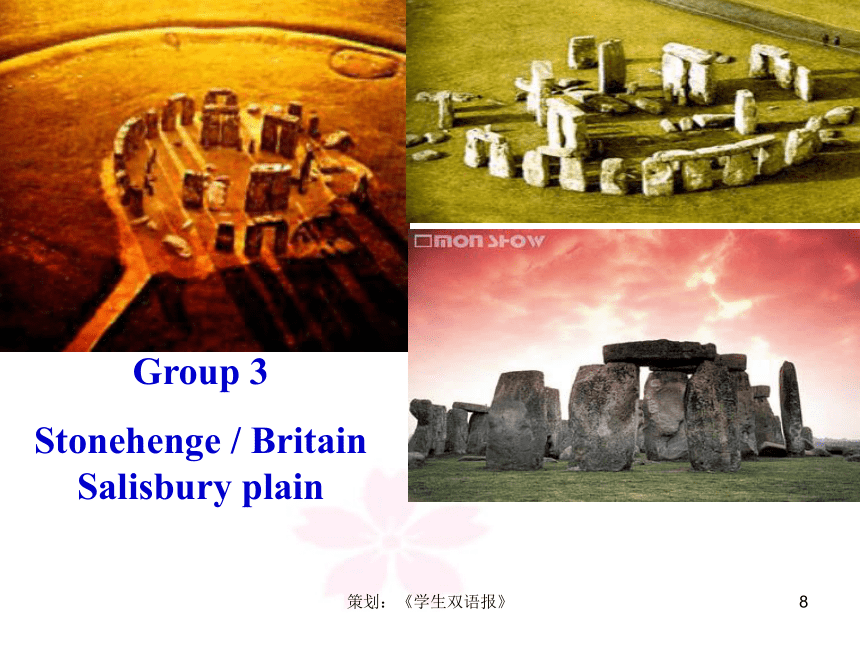
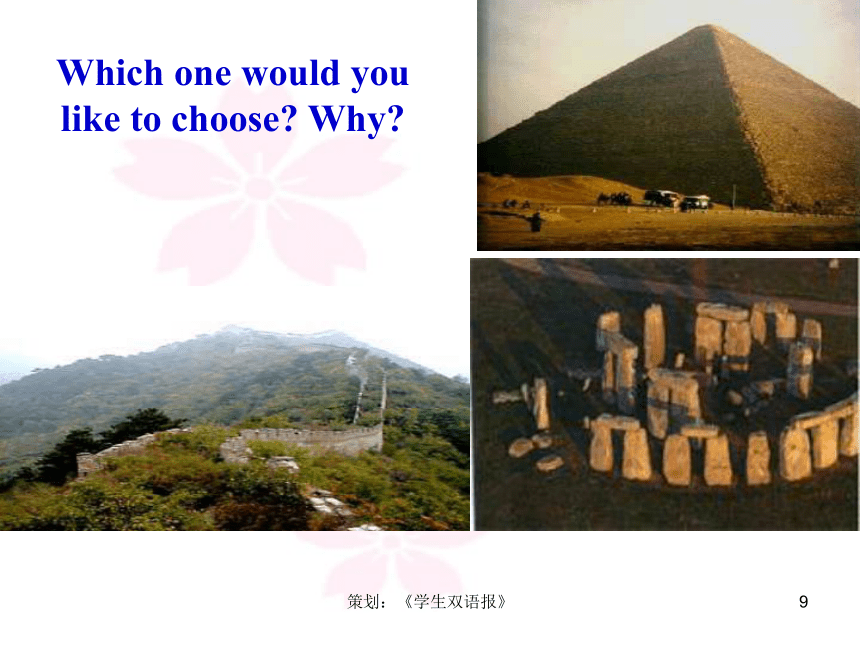
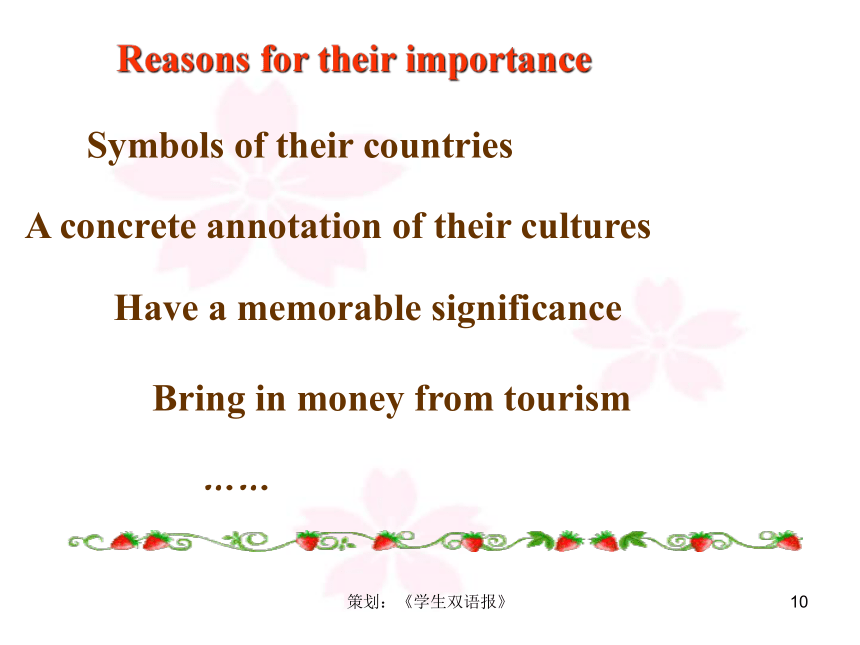
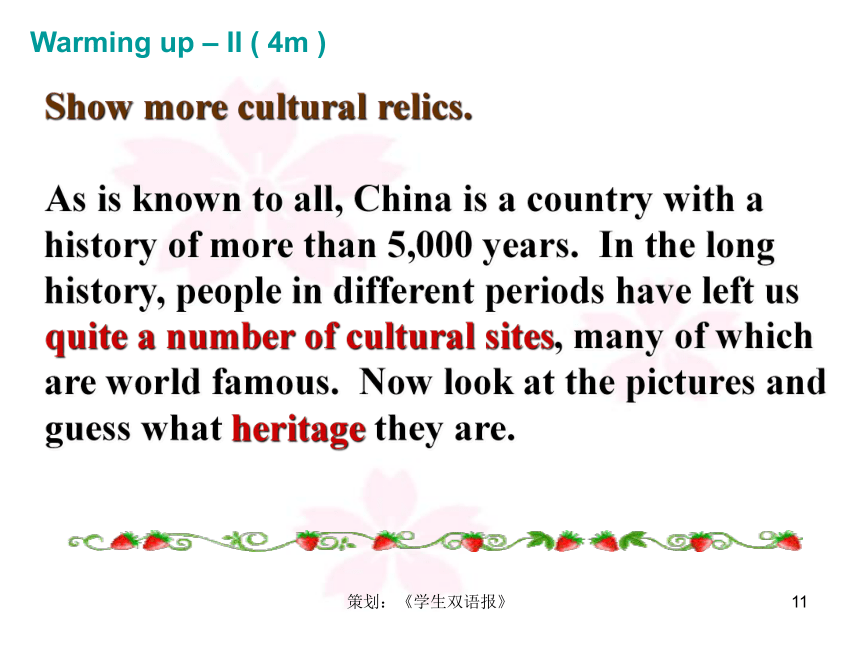

文档简介
课件130张PPT。策划:《学生双语报》1Unit 1 Cultural relics策划:《学生双语报》2English Song
English Class
Video Data
Language Data Bank策划:《学生双语报》3课时分配策划:《学生双语报》4Period 1&2 Warming
up and Reading IPeriod 1&2: 幻灯片9-40页Unit 1 Cultural relics策划:《学生双语报》5Warming up – I ( 6m ) Look at the three groups of pictures and discuss these questions.
1. Do you know these places?
2. If you know, what do you know about the places?
3. Which one would you like to visit? Why?策划:《学生双语报》6Group 1
The Pyramids
in Egypt策划:《学生双语报》7Group 2
The Great Wall/China策划:《学生双语报》8Group 3
Stonehenge / Britain Salisbury plain策划:《学生双语报》9Which one would you like to choose? Why?策划:《学生双语报》10Reasons for their importanceSymbols of their countries A concrete annotation of their culturesHave a memorable significanceBring in money from tourism……策划:《学生双语报》11Show more cultural relics.
As is known to all, China is a country with a history of more than 5,000 years. In the long history, people in different periods have left us quite a number of cultural sites, many of which are world famous. Now look at the pictures and guess what heritage they are. Warming up – II ( 4m ) 策划:《学生双语报》12Forbidden City策划:《学生双语报》13Potala Palace, Lhasa策划:《学生双语报》14Mount Huangshan (1990)策划:《学生双语报》15Longmen Grottoes (2000)策划:《学生双语报》16Jiuzhaigou Valley Scenic and Historic Interest Area (1992)策划:《学生双语报》17Classical Gardens of Suzhou (1997)策划:《学生双语报》18Pre-reading ( 2m )
Students answer the following questions:
What is your favorite city? Why?
What makes a city great?
a long history
cultural relics
many great people
important events taking place there策划:《学生双语报》19Listen to the tape and read after it, then finish the exercises in comprehending. Answer keys:
Ex 1: 1.B 2.D 3.B 4.A 5.CReading -- I Multiple choice ( 5m ) 策划:《学生双语报》20Reading: SURE or NOT SURE1.The Amber room was not easy to make.2.Catherine II didn’t like everything about the Amber Room when she first saw it.3.The Amber room was taken to Konigsberg and hidden there in 1941.4.The Russians didn’t care about the Amber Room.NSSSNS5.The Russians don’t think the Amber Room will ever be found.NSReading -- II Sure or not sure ( 5m ) 策划:《学生双语报》21Read the text again and answer the following questions(discuss in pairs):Reading -- III Answering questions ( 5m ) 策划:《学生双语报》221.What was given to the Russian people as a great gift by Frederick William I ,the king of Prussia?
2.Why it is called the Amber room and how many tons of amber were used to make the Amber Room?
3.What did Catherine the Great do with the Amber Room?
4.What happened to the Amber Room?策划:《学生双语报》231.What was given to the Russian people as a great gift by Frederick William I ,the king of Prussia?策划:《学生双语报》24The great Amber Room was given to the Russian people as a great gift by the king.策划:《学生双语报》252.Why it is called the Amber room and how many tons of amber were used to make the Amber Room?策划:《学生双语报》26Because it was made of almost seven thousand toms of amber, which has a beautiful yellow brown color.策划:《学生双语报》273.What did Catherine the Great do with the Amber Room?策划:《学生双语报》28She had the Amber Room moved to the palace outside St Petersburg and transformed it.策划:《学生双语报》294.What happened to the Amber Room?策划:《学生双语报》30It was taken apart and missing in the second world war, and the Russians and Germans have built a new Amber room at the summer palace.策划:《学生双语报》31Reading – IV ( 3m )Find out all the people related to the Amber Room from the text.
Frederick I
Frederick William I
Peter the Great
Catherine II
The Nazi German策划:《学生双语报》32Group work ( 10m )Discuss the following topic in groups, then show your opinions:
Do you think it is meaningful to rebuild the new Amber Room? Why? 策划:《学生双语报》33Homework1. Try to tell the story about the Amber Room.
2. Prepare for the next class. 策划:《学生双语报》34Language points for reading I策划:《学生双语报》35Take a break!策划:《学生双语报》36Period 3 Learning
about languageUnit 1 Cultural relics Period 3: 幻灯片41-81页策划:《学生双语报》371. rare
2. vase
3. in return
4. in search of
5. belong to
Checking answer – I (2m) Answer keys for Ex.1 on Page 3:6. heat
7. remain
8. gift
9. doubt
10. remove
策划:《学生双语报》38Checking answer – II ( 4m ) Answer keys for Ex.3 on Page 4:1. This was a time when the two countries were in a state of war.
2. She was working in the garden all this morning.
3. Children who are playing often make a lot of noise.
4. When we called, the family were having their dinner.
5. What are they doing now? They are having their meal.策划:《学生双语报》39.
Useful structure ( 30m )The Restrictive and Non-Restrictive Attributive Clause策划:《学生双语报》40一、关系代词:
1. who指人,作主语或宾语 (作宾语可省略)The man who I talked with is our teacher.A person who steals things is called a thief.2. whom指人,作宾语 (作宾语可省略,
如介词提前则不能省) The man (whom/who) I nodded to is Mr. Li.The man to whom I nodded is Professor Li.策划:《学生双语报》41applethe red
the green
the small
the bigThe apple which is red is mine.The apple which is green is yours.The apple which is red is smallThe apple which is green is big.策划:《学生双语报》42 ? Mrs. Clark is angry with the goat. The goat is eating her flowers.Mrs. Clark is angry with the goat which
is eating her flowers.? Can you lend me the book?
You talked about it last night.Can you lend me the book (which) you
talked about last night.Can you lend me the book about which
you talked last night? 策划:《学生双语报》43Do you find the pen?
I wrote with it just now.Do you find the pen with which I wrote
just now?Do you find the pen (which) I wrote
with just now? 策划:《学生双语报》443. which 指物,作主语或宾语 (作宾语可省略,
如介词提前则不能省) These are the trees which were planted
last year.This recorder (which) he is using is
made in Japan. Is this the library (which) you borrow books from?Is this the library from which you borrow
books?策划:《学生双语报》45 ? that 指人/物,作主语或宾语 (作宾语可省略)A plane is a machine. It can fly.A plane is a machine that can fly.He is the man. I told you about him.He is the man (that) I told you about.策划:《学生双语报》46He is the man (that) I told you about.? 注意:介词提前时只能用which 而不能用that 。4. that 指人/物,作主语或宾语 (作宾语可省略)A plane is a machine that can fly. ? that和which在指物的情况下一般都可以互换, 但在下列情况下, 一般用that而不用which。I am sure she has something (that) you can borrow.I’ve read all the books that are not mine. This is the first book (that) he has read.This is the very book that belongs to him.(1) 先行词为all, everything, nothing, something,
anything, little, much 等不定代词时。(2)先行词被all, every, no, some, any, little, much等
修饰时。(3)先行词被序数词或最高级修饰时。(4)先行词被the only, the very, the same, the last修饰时。策划:《学生双语报》48(1) The scientist is very famous in the world. We met her yesterday.The scientist ? we met yesterday is very famous
who in the world.
whom
that(2) The dress is new. She is wearing it.The dress that she is wearing is new.
which
? 策划:《学生双语报》49(3) He is the kind person.
I have ever worked with him. (4) This is the best film. I have ever seen this film.He is the kind person that I have ever worked with.
who
whom
?This is the best film that I have ever seen.
?策划:《学生双语报》50 二、关系副词引导的定语从句
关系副词可代替的先行词是时间、地点或理由的名词,在从句中作状语。策划:《学生双语报》51
1、关系副词when, where, why 的含义相当于 “介词+ which” 结构,因此常常和“介词+ which”结构交替使用。例如:a) 我仍然记得 我参军的 那一天。 ①I still remember the day.②On that day I joined the army.I still remember the day when I joined the army. 或I still remember the day on which I joined the army. 策划:《学生双语报》52b) 这就是 我们去年住的 房屋。①This is the house.②We lived in it last year.This is the house where we lived last year. 或This is the house in which we lived last year. 或 This is the house which we lived in last year. 策划:《学生双语报》53c) 你知道 他迟到的 原因吗?①Do you know the reason?②He was late for that reason.Do you know the reason why he was late? 或Do you know the reason for which he was late? 2、当先行词是指时间、地点或原因时,并非就用when, where, why 来引导定语从句。 例如:策划:《学生双语报》54 这是我们去年参观的地方。 ······① 这是我们去年工作的地方。 ······②a)vt.vi.①This is the place which / that we visited last year.②This is the place where we worked last year. 我仍然记得我入团的那一天。 我仍然记得我们一起度过的那一天。b)①I still remember the day when I joined the League.②I still remember the day that / which we spent together.策划:《学生双语报》55 三、判断关系代词与关系副词
方法一: 用关系代词,还是关系副词完全
This is the mountain village where I stayed last year.这是我去年呆过的山村。取决于从句中的谓语动词。及物动词后面无宾语,就必须要求用关系代词;而不及物动词则要求用关系副词。例如:I'll never forget the days when I worked together with you.我永远不会忘记与你共事的日子。策划:《学生双语报》56
方法二:准确判断先行词在定语从句中的成分(主、谓、宾、定、状),也能正确选择出关系代词/关系副词。A. where B. that C. on which D. the one例1. Is this the museum _____ you visited a few days ago?例2. Is this museum _____ you visited a few days ago?A. where B. that C. on which D. the oneBD策划:《学生双语报》571. 限定性定语从句是对先行词起限定作用的。去掉这个从句则整句话不完整或不成立。
Eg: He who doesn’t go to the Great Wall is not a true man.
-----He is not a true man.不完整
四、限定性、非限定性定语从句 策划:《学生双语报》58The mooncake that has egg in it is the mooncake which I like best.
----- The mooncake is the mooncake.不成立
大多数定语从句是限定性定语从句。
2. 非限定性定语从句是对先行词起解释、说明作用的。去掉这个从句整句话仍成立。常被逗号隔开。
Eg: I have a dog, which can do many things for me.
策划:《学生双语报》593. 定语从句的练习
Put the two sentences into one:
1. Our friends missed the train again.
They are always late for everything.
2. My aunt was waiting for me on the steps.
She had two heavy bags.
策划:《学生双语报》603. The dog is easily frightened.
It was beaten when it was small.
4. I was invited to join by my neighbor.
He has been a League member for three years.
策划:《学生双语报》61Keys :
1. Our friends, who are always late for everything, missed the train again.
2. My aunt, who had two heavy bags, was waiting for me on the steps.
3. The dog, which was beaten when it was small, is easily frightened.
4. I was invites to join by my neighbor, who has been a League member for three years.策划:《学生双语报》62Discovering useful structureChecking answers – I
Answer keys for Ex.1 on Page 4:
1. It is your job to look into any reports of cultural relics that have been found in China.
2. You are sent to a small town where you find a relic that was stolen from a place.
3. Think of a cultural relic you know about.策划:《学生双语报》634. The gift was the Amber Room, which was given this name because almost seven thousands of amber were used to make it.
5. Later, Catherine II had the Amber Room moved to the palace outside St Pertersburg where she spent her summers.
6. In 1770, the room was completed the way she wanted it.
7. This was a time when the two countries were at war.策划:《学生双语报》64Checking answers – II Answer keys for Ex.2 on Page 4:1.Here are the farmers who discovered the underground city last month.
2. Xi’an is one of the few city in which/where city walls remain as good as before.
Xi’an is one of the few city whose walls remain as good as before.
Xi’an is one of the few city with walls which remain as good as before.
策划:《学生双语报》653. Shaanxi Province is a place where relics are well looked after.
Shaanxi Province is a place with many cultural relics which are well looked after.
Shaanxi Province is a place whose cultural relics are well looked after.
4. The woman remembered the day when she saw Nazis burying something near her home.策划:《学生双语报》665. The old man you are talking to saw some Germans taking apart the Amber Room and moving it away.策划:《学生双语报》671. St Pertersburg is a very beautiful city, which was once called Leningrad.
St Pertersburg, which was once called Leningrad, is a very beautiful city.
2. In Xi’an, I met a teacher who has a strong love for cultural relics and who took me to visit the history museum.Checking answers – III Answer keys for Ex.3 on Page 4&5:策划:《学生双语报》683. I don’t remember the solider who told me not to tell anyone what I have seen.
4. People didn’t pay as much attention to cultural relics in the old days, when my grandfather was a child.
5. They moved the boxes to a mine, where they wanted to hide them.
策划:《学生双语报》69After leaving the army, Mr Brown came to China in search of a job.
How could you take apart a good quality chair in order to fix the desks?
I’m not quite sure who(m) the gift belong to.
John mentioned the names of a few judges who he did not think highly of.
Checking answers – IV Answer keys for Ex.3 on Page 43( workbook):策划:《学生双语报》705. We looked into the report of the eyewitness carefully and found he didn’t give the facts.
6. She gave us food and clothes and asked for nothing in return.
7. There is no doubt that the search for those lost cultural relics will continue.策划:《学生双语报》71The film brought the hours back to me ____ I was taken good care of in that far-away village.
A. until B. that C. when D. where高考链接解析:本题考查定语从句。解本题得关键是要先找准先行词“the hours”,然后理解关系副词“when”本身在其引导的定语从句中充当时间状语。答案C.策划:《学生双语报》722. He paid the boy $ 10 for washing ten windows,most of _______ had’t been cleaned for at least a year.
A. these B. those C. that D. which 高考链接解析:这是一个定语从句。定语从句的先行词为windows。 有的考生误认为前文提到windows,应用those 代替而选B。但those不可用做关系代词引导定语从句。由于横线处前有介词of不能选that。答案 D策划:《学生双语报》733.Recently I bought an ancient Chinese vase, ____ was very reasonable.
A. which price B. the price of which
C.its price D. the price of whose高考链接解析:此题四个代选项中都有price这一词语,要表示Chinese vase 的价格,所以关系代词语先行词分隔。“its price” 不表示所有格;由于whose本身就可作定语,不需再用of属格。故A、C、D三项均应排除。答案B.策划:《学生双语报》744. He’s got himself into a dangerous situation ____ he is likely to lose control over the plane.
A. where B. which C. while D. why高考链接解析:先行词situation作“处境”讲,引导定语从句是使用关系代词还是使用关系副词,决定于关系词在从句中所担任的成分。此题的关系词在从句中担任状语,故选用A项。C、D两项的while,why不具有引导定语从句的句法功能。答案为A.策划:《学生双语报》75HomeworkFinish the exercises on workbook.
Do more exercises about the Restrictive and Non-Restrictive Attributive Clause.
Prepare for the next class.策划:《学生双语报》76Take a break!策划:《学生双语报》77Period 4 Reading
and ListeningUnit 1 Cultural relics Period 4: 幻灯片82-90页策划:《学生双语报》78Reading ( 5m ) Read the text , then answer the following questions.
1. What should a judge do in a trial?
2. What is an evidence?
3. What is a fact?
4. What is an opinion?
策划:《学生双语报》79Listening ( 20m ) Listen to the tape for Part 2 on Page5, and fill in the blanks in Part 3.play three times, then check the answers.策划:《学生双语报》80Jan Haseka minerCzech Republic1945; nowsomething explodedHe saw some German soldiers putting boxes in the mine .All the holes in the mines were filled. nothingThe Amber Room and some gold are buried in the mine.策划:《学生双语报》81She heard about the Nazis stealing many treasures from Russia and that something exploded at the end of August, 1944.Many trucks came to the castle one night before Christmas in 1941.She saw fries from the castle one night in August,1944. nothingThe pieces of the Amber Room were burnt during the war策划:《学生双语报》82He was told to help some soldiers put big wooden boxes with treasures onto a ship and a group of people is searching for the ship now.A Russian submarine sank the shipHe had to swim three kilometres until a German boat saved him.Those wooden boxes must be buried in the sand.策划:《学生双语报》83Group work ( 12m ) According to the above forms, discuss which person gave the best evidence.Use the expressions in Part 2 on Page 6. ( Each group should give their answer. )策划:《学生双语报》84Homework Search some information about evidence and opinion.
2. Prepare for the next class. 策划:《学生双语报》85Take a break!策划:《学生双语报》86Period 5 Listening
and SpeakingUnit 1 Cultural relics Period 5: 幻灯片91-98页策划:《学生双语报》87Listening – I ( 12m ) Listen to tape for three times, finish the exercises of Listening on Page 41.Suggested answers:
Reason 1: The dam was built to stop floods on the Nile River.
Reason 2: It was built to give people more electricity.
2. The water in the lake behind the dam rose. 53,000 people had to move and some temples were in danger.策划:《学生双语报》883. False ( It is one of the world’s largest. When completed, the Three Gorges Dam will be the world’s largest.)
4. The dam would put it under water.
5. The engineers needed to find a way to move the relic to safety.
6. (3) The listening text only says that visitors are glad to see it.
7. Students give their own answers.策划:《学生双语报》89Answer keys to Ex 2:
Harvard university; teacher / professor
Europe; buildings
traditional; modernListening – II ( 8m ) Listen to tape for twice, finish exercise 2 of Listening task on Page 44.策划:《学生双语报》90Students practice for five minutes, then ask some of them to tell. Speaking – I Pair work ( 10m ) Tell something about one of the cultural relics that you have ever visited. ( practice in pairs ) 策划:《学生双语报》91After the students tell something about some cultural relics, let them have a debate on the following topic:
Do you think China should save all of its cultural relics?
( Divide the class into two groups, first collect ideas, then one side will agree, saying “ Yes, we should save all our cultural relics.” The other side will not agree, saying “No, we should not save all our cultural relics, only save the best ones.” Both sides should give enough reasons.)Speaking – II Debate ( 10m ) 策划:《学生双语报》92HomeworkSummarize the ideas for the debate.
Prepare for the next class.
策划:《学生双语报》93Take a break!策划:《学生双语报》94Period 6 WritingUnit 1 Cultural relics Period 6: 幻灯片99-107页策划:《学生双语报》95Reading ( 5m ) Read the letter of Ex. 2 on Page 7, pay attention to the patterns about giving opinions, and make sure if you agree with the writer.Writing ( 15m )
Write a reply to Johann’s letter according to the requests in Part 1 on Page 7.
策划:《学生双语报》96Checking answers ( 15m )*After writing, the students change their letters with their partners and correct it, then show some letters on the screen.
*The teacher gives some advice according to the students’ letters, then show the suggested answers.策划:《学生双语报》97Model A:
Dear Johann,
I must say that I agree with you. If you find
, it should belong to you because ____________________________ .
Even if I lost something, I wouldn’t expect
______________ .Once I lost a _____ .I decided not to __________________ . you are the person who found itsomethingto get it backringlook for it too much策划:《学生双语报》98People need to understand that ______________________________________ .
Your letter helps me to remember that people
need to be careful with _____________ . Then they won’t need to worry about ____________ .So you see,Johann, I got two rewards: one I could ________________ and one I could _______________ .
Yours,
Hu Xiaomin when they lose something they lose the right to own it.their thingslosing themgive to otherslearn from 策划:《学生双语报》99Dear Johann,
I must say that I don’t agree with you. Though you find __________,it does n’t mean it belongs to you.If you can find out who it belongs to,you should ____________. I am sure you would want someone to __________.Once I found a beautiful ___________. I wanted to ________.Then I remembered seeing one just like it in ________.I went to the __________ and found the __________to whom it belonged.__________was very _________to get it back and gave me some delicious apples.So you see,Johann,I got two rewards:one I could eat and one I could keep in my heart.策划:《学生双语报》100Dear Johann,
I must say that I don’t agree with you. Though you find something,it does n’t mean it belongs to you.If you can find out who it belongs to,you should try to return it. I am sure you would want someone to do the same for you.Once I found a beautiful picture. I wanted to keep it.Then I remembered seeing one just like it in an office.I went to the office and found the person to whom it belonged. The lady was very happy to get it back and gave me some delicious apples.So you see,Johann,I got two rewards:one I could eat and one I could keep in my heart.策划:《学生双语报》101HomeworkFinish the writing task on Page 46.
Prepare for the next class.策划:《学生双语报》102Take a break!策划:《学生双语报》103Language points for Reading ILanguage Data Bank幻灯片108-135页策划:《学生双语报》104A cultural relic is something that has survived for a long time, often a part of something old that has remained when the rest of it has been destroyed. (P3, L1)文化遗迹是一些存留很长时间的东西,常常是其他部分已被毁掉而其中一部分得以保存的古老的东西。
Language points for Reading I策划:《学生双语报》1051) survive
E.g: Many strange customs have survived from earlier times.
Few buildings survived the earthquake.
The man survived his sister by three years.vi. 继续生存或存在 vt. 经历某遭遇后幸存vt. 比……长寿,比……活得长策划:《学生双语报》106survive: vi. continue to live or exist.
vt. Continue to live or exist in spite of nearly being killed or destroyed by sth.
vt. Remain alive after sb., live or exist longer than
He’s survived by his wife and two babies.
He is the last surviving member of the family.
Few birds managed to survive the winter last year.
策划:《学生双语报》1072) a part of & part of A part of the books have arrived.
A leg is a part of the body.
He gave me back only part of the money I lent him.
Part of the house was burnt in the fire.
Part of the passengers were injured in the accident.
*Part of it _________ good.
*Part of them _____________ good. areisare策划:《学生双语报》1083) something
通常用于肯定句,而在疑问句、否定句、if/weather从句中用anything。
I want something to eat.
I din’t have anything today.
Is there anything wrong with this stove?
*Would you like something to eat?
但当说话者心中的肯定意识较强时,或实际上表示请求建议时,一般不用anything而用something.策划:《学生双语报》1094) remain
After the fire, very little remained of my house.
Much work remained to be done.
I’ll remain to see the end of the game.
He remained silent after class.
The door remained closed.
vi. be left or present after other parts have been removed or used or dealt with.vi. be left to be seen, done, etc.vi. stay behind, stay in the same place.linking verb. continue to be策划:《学生双语报》1105)the rest of ……的其余部分a. The rest of the book _________ not very interesting.
b. The rest of the group ________ in the classroom.isare策划:《学生双语报》1112. Imagine that you work for the state office of cultural relics. (P1,L4)设想一下,你为国家文物局工作。
1) Can you imagine life without electricity?
I could hardly imagine living in that kind of place.
2) I can’t imagine her marrying him.
3) Can you imagine how worried I was then?
I imagine that I have met you somewhere before.
imagine + n./ doing/ sb doing sth/ that- clause策划:《学生双语报》1123. It is your job to look into any reports of cultural relics that have been found in China. (P1, L4)你的工作是调查研究所有关于在中国发现的文物的报告。
look into 调查、了解、研究
1) The police are looking into all the records of the man.
2) He looks into her face with great interest.
3) I’ll look into the matter as soon as possible. Just have a little patience.策划:《学生双语报》1134. The man who has it insists that it belongs to his family. (P1,L6)
1) insist + n/ that …(should) do /that…
insist on doing sth.
a. He insisted that the money _______________________ to him at once. (return)
b. He insisted that he ___________ the money. (not steal)
c. I insisted on his __________ there right away. (go)(should) be returnedhadn’t stolengoing策划:《学生双语报》1142)belong to 属于 (P3) 不可以用于被动语态,或进行时Correct the mistake
The house was belonged to an old lady.
China is a country that is belonging to the Third World.
As a writer, he really belongs the 18th century.
This map is belonging on the table.策划:《学生双语报》1155. If you find a cultural relic, what will you do with it? (P1, pre-reading)
★ do with
1)I didn’t know what to do with the old tree.
2)The new teacher didn’t know what to do with the class.
3)What have you done with the papers for the meeting?
4)We have nothing else to eat, you have to do with some bread.
5)I cannot do with loud noise.
处理,处置对待(某人)放置以……将就(一下)忍受(与cannot连用)策划:《学生双语报》116★ do with & deal withWhat to do with the problem?
How to deal with the problem?
策划:《学生双语报》1176. Frederick William I, the King of Prussia, could never have imagined that his greatest gift to the Russian people would have such a strange history. (P1, L1)
普鲁士国王腓特烈·威廉一世从来也不会想到他赠送给俄国人民的礼物会有如此离奇的历史。
could not/never have done 对过去所发生事情的否定推测策划:《学生双语报》1187. Although it feels as hard as stone, it easily melts when heated. (P1, L4) 尽管它摸上去像石头一样坚硬,然而加热时它却很容易融化。
when heated 是when it is heated 的省略形式。状语从句中,若其主语和主句的主语一致,同时谓语动词含有系动词be, 或it is/was结构,可省去该从句的主语和系动词be,留下其余部分。
Turn to him for help if necessary.
When __________ why he was late, he went red. (ask)
Be careful when __________ the street. (cross)
askedcrossing策划:《学生双语报》1198. Once it is heated, the amber room can be made into any shape. (P1, L4) 一旦加热,可以把琥珀制作成任何形状。
once 为从属连词,意为“一旦”
Once you begin to do it, you must do it well.
Once you see it, you’ll like it.
be made into 被制成
由……制成(能看出原材料)
由……制成(看不出原材料)
由……组成/构成
产于,生产于(某地/某时)be made ofbe made frombe made up ofbe made in策划:《学生双语报》120The wood here will _____________ table.
The bottle ___________ glass.
The kind of wine ________________ grapes.
This class _____________ 60 students.
The ______________ china.
be made intois made ofis made from is made up ofare made in策划:《学生双语报》1219. The design for the room was of the fancy style popular in those days. (P1, L5) 琥珀屋的设计具有当时那个年代最流行的奇特风格。
fancy
adj. 奇特的,花样的
I don’t feel like making a fancy meal.
策划:《学生双语报》122vt. 想象,推测,假想
1) Don’t fancy that you can succeed without hard work.
2) I can’t fancy his doing such a thing.
3) I fancied him to be dead.
4) He fancies himself as a good writer.
5) Do you fancy a glass of coffee?
6) I don’t fancy walking in the rain.
fancy + that-/one’s doing sth/sb to be…/sb as/sth/doing sth策划:《学生双语报》123of the fancy style
“of +抽象名词”表示人或事物所具有的特征,特性,可在句中做表语或后置定语。
They are of different sizes, but they are the same in weight.
I don’t find anything of interest in today’s newspaper
Your advise is of great help to learners of English.
They are of great help to learners of English.策划:《学生双语报》124of great importance=
of interest=
of use=
of value=
of help=
importantinterestingusefulvaluablehelpful策划:《学生双语报》125of high quality
of different colours
of the same size
of this kind高质量的颜色不同的一样大小的属于这一类的策划:《学生双语报》12610. About four metres long, the room served as a small reception hall for important visitors. (Para2, L9) 琥珀屋约四米长,做了接待贵宾的小接待厅。
serve as 担任,充当
He served two terms as President.
He served as a waiter there.
When you sleep in the open, old newspapers can serve as a blanket.策划:《学生双语报》12711. She told her artists to add more details to its design. (Para3, L3) 她告诉他的艺术家们将设计方案再增加更多的细节。
add…to…把……加进……里去
He added that he was very pleased with our work.
Please add some sugar to the milk.
Add the score up.
His being absent added to our difficulty.
The money he spent one day added up to about $100.策划:《学生双语报》12812. This was a time when the two countries were at war. (Para4, L2)这是两国交战时期。
at war 处于战争状态,介词at可表示状态或动作。
at peace at breakfast
at rest at table
at work at school
at the piano at one’s best策划:《学生双语报》12913. There is no doubt that the boxes were then put on a train for Konigsberg, at that time a German city on the Baltic Sea. (Para4, L6) 毫无疑问,这些箱子后来被装上火车运往哥尼斯堡,当时它是波罗的海边的一个德国城市。
There is no doubt
= It’s clear
= It’s beyond argument策划:《学生双语报》130The End
English Class
Video Data
Language Data Bank策划:《学生双语报》3课时分配策划:《学生双语报》4Period 1&2 Warming
up and Reading IPeriod 1&2: 幻灯片9-40页Unit 1 Cultural relics策划:《学生双语报》5Warming up – I ( 6m ) Look at the three groups of pictures and discuss these questions.
1. Do you know these places?
2. If you know, what do you know about the places?
3. Which one would you like to visit? Why?策划:《学生双语报》6Group 1
The Pyramids
in Egypt策划:《学生双语报》7Group 2
The Great Wall/China策划:《学生双语报》8Group 3
Stonehenge / Britain Salisbury plain策划:《学生双语报》9Which one would you like to choose? Why?策划:《学生双语报》10Reasons for their importanceSymbols of their countries A concrete annotation of their culturesHave a memorable significanceBring in money from tourism……策划:《学生双语报》11Show more cultural relics.
As is known to all, China is a country with a history of more than 5,000 years. In the long history, people in different periods have left us quite a number of cultural sites, many of which are world famous. Now look at the pictures and guess what heritage they are. Warming up – II ( 4m ) 策划:《学生双语报》12Forbidden City策划:《学生双语报》13Potala Palace, Lhasa策划:《学生双语报》14Mount Huangshan (1990)策划:《学生双语报》15Longmen Grottoes (2000)策划:《学生双语报》16Jiuzhaigou Valley Scenic and Historic Interest Area (1992)策划:《学生双语报》17Classical Gardens of Suzhou (1997)策划:《学生双语报》18Pre-reading ( 2m )
Students answer the following questions:
What is your favorite city? Why?
What makes a city great?
a long history
cultural relics
many great people
important events taking place there策划:《学生双语报》19Listen to the tape and read after it, then finish the exercises in comprehending. Answer keys:
Ex 1: 1.B 2.D 3.B 4.A 5.CReading -- I Multiple choice ( 5m ) 策划:《学生双语报》20Reading: SURE or NOT SURE1.The Amber room was not easy to make.2.Catherine II didn’t like everything about the Amber Room when she first saw it.3.The Amber room was taken to Konigsberg and hidden there in 1941.4.The Russians didn’t care about the Amber Room.NSSSNS5.The Russians don’t think the Amber Room will ever be found.NSReading -- II Sure or not sure ( 5m ) 策划:《学生双语报》21Read the text again and answer the following questions(discuss in pairs):Reading -- III Answering questions ( 5m ) 策划:《学生双语报》221.What was given to the Russian people as a great gift by Frederick William I ,the king of Prussia?
2.Why it is called the Amber room and how many tons of amber were used to make the Amber Room?
3.What did Catherine the Great do with the Amber Room?
4.What happened to the Amber Room?策划:《学生双语报》231.What was given to the Russian people as a great gift by Frederick William I ,the king of Prussia?策划:《学生双语报》24The great Amber Room was given to the Russian people as a great gift by the king.策划:《学生双语报》252.Why it is called the Amber room and how many tons of amber were used to make the Amber Room?策划:《学生双语报》26Because it was made of almost seven thousand toms of amber, which has a beautiful yellow brown color.策划:《学生双语报》273.What did Catherine the Great do with the Amber Room?策划:《学生双语报》28She had the Amber Room moved to the palace outside St Petersburg and transformed it.策划:《学生双语报》294.What happened to the Amber Room?策划:《学生双语报》30It was taken apart and missing in the second world war, and the Russians and Germans have built a new Amber room at the summer palace.策划:《学生双语报》31Reading – IV ( 3m )Find out all the people related to the Amber Room from the text.
Frederick I
Frederick William I
Peter the Great
Catherine II
The Nazi German策划:《学生双语报》32Group work ( 10m )Discuss the following topic in groups, then show your opinions:
Do you think it is meaningful to rebuild the new Amber Room? Why? 策划:《学生双语报》33Homework1. Try to tell the story about the Amber Room.
2. Prepare for the next class. 策划:《学生双语报》34Language points for reading I策划:《学生双语报》35Take a break!策划:《学生双语报》36Period 3 Learning
about languageUnit 1 Cultural relics Period 3: 幻灯片41-81页策划:《学生双语报》371. rare
2. vase
3. in return
4. in search of
5. belong to
Checking answer – I (2m) Answer keys for Ex.1 on Page 3:6. heat
7. remain
8. gift
9. doubt
10. remove
策划:《学生双语报》38Checking answer – II ( 4m ) Answer keys for Ex.3 on Page 4:1. This was a time when the two countries were in a state of war.
2. She was working in the garden all this morning.
3. Children who are playing often make a lot of noise.
4. When we called, the family were having their dinner.
5. What are they doing now? They are having their meal.策划:《学生双语报》39.
Useful structure ( 30m )The Restrictive and Non-Restrictive Attributive Clause策划:《学生双语报》40一、关系代词:
1. who指人,作主语或宾语 (作宾语可省略)The man who I talked with is our teacher.A person who steals things is called a thief.2. whom指人,作宾语 (作宾语可省略,
如介词提前则不能省) The man (whom/who) I nodded to is Mr. Li.The man to whom I nodded is Professor Li.策划:《学生双语报》41applethe red
the green
the small
the bigThe apple which is red is mine.The apple which is green is yours.The apple which is red is smallThe apple which is green is big.策划:《学生双语报》42 ? Mrs. Clark is angry with the goat. The goat is eating her flowers.Mrs. Clark is angry with the goat which
is eating her flowers.? Can you lend me the book?
You talked about it last night.Can you lend me the book (which) you
talked about last night.Can you lend me the book about which
you talked last night? 策划:《学生双语报》43Do you find the pen?
I wrote with it just now.Do you find the pen with which I wrote
just now?Do you find the pen (which) I wrote
with just now? 策划:《学生双语报》443. which 指物,作主语或宾语 (作宾语可省略,
如介词提前则不能省) These are the trees which were planted
last year.This recorder (which) he is using is
made in Japan. Is this the library (which) you borrow books from?Is this the library from which you borrow
books?策划:《学生双语报》45 ? that 指人/物,作主语或宾语 (作宾语可省略)A plane is a machine. It can fly.A plane is a machine that can fly.He is the man. I told you about him.He is the man (that) I told you about.策划:《学生双语报》46He is the man (that) I told you about.? 注意:介词提前时只能用which 而不能用that 。4. that 指人/物,作主语或宾语 (作宾语可省略)A plane is a machine that can fly. ? that和which在指物的情况下一般都可以互换, 但在下列情况下, 一般用that而不用which。I am sure she has something (that) you can borrow.I’ve read all the books that are not mine. This is the first book (that) he has read.This is the very book that belongs to him.(1) 先行词为all, everything, nothing, something,
anything, little, much 等不定代词时。(2)先行词被all, every, no, some, any, little, much等
修饰时。(3)先行词被序数词或最高级修饰时。(4)先行词被the only, the very, the same, the last修饰时。策划:《学生双语报》48(1) The scientist is very famous in the world. We met her yesterday.The scientist ? we met yesterday is very famous
who in the world.
whom
that(2) The dress is new. She is wearing it.The dress that she is wearing is new.
which
? 策划:《学生双语报》49(3) He is the kind person.
I have ever worked with him. (4) This is the best film. I have ever seen this film.He is the kind person that I have ever worked with.
who
whom
?This is the best film that I have ever seen.
?策划:《学生双语报》50 二、关系副词引导的定语从句
关系副词可代替的先行词是时间、地点或理由的名词,在从句中作状语。策划:《学生双语报》51
1、关系副词when, where, why 的含义相当于 “介词+ which” 结构,因此常常和“介词+ which”结构交替使用。例如:a) 我仍然记得 我参军的 那一天。 ①I still remember the day.②On that day I joined the army.I still remember the day when I joined the army. 或I still remember the day on which I joined the army. 策划:《学生双语报》52b) 这就是 我们去年住的 房屋。①This is the house.②We lived in it last year.This is the house where we lived last year. 或This is the house in which we lived last year. 或 This is the house which we lived in last year. 策划:《学生双语报》53c) 你知道 他迟到的 原因吗?①Do you know the reason?②He was late for that reason.Do you know the reason why he was late? 或Do you know the reason for which he was late? 2、当先行词是指时间、地点或原因时,并非就用when, where, why 来引导定语从句。 例如:策划:《学生双语报》54 这是我们去年参观的地方。 ······① 这是我们去年工作的地方。 ······②a)vt.vi.①This is the place which / that we visited last year.②This is the place where we worked last year. 我仍然记得我入团的那一天。 我仍然记得我们一起度过的那一天。b)①I still remember the day when I joined the League.②I still remember the day that / which we spent together.策划:《学生双语报》55 三、判断关系代词与关系副词
方法一: 用关系代词,还是关系副词完全
This is the mountain village where I stayed last year.这是我去年呆过的山村。取决于从句中的谓语动词。及物动词后面无宾语,就必须要求用关系代词;而不及物动词则要求用关系副词。例如:I'll never forget the days when I worked together with you.我永远不会忘记与你共事的日子。策划:《学生双语报》56
方法二:准确判断先行词在定语从句中的成分(主、谓、宾、定、状),也能正确选择出关系代词/关系副词。A. where B. that C. on which D. the one例1. Is this the museum _____ you visited a few days ago?例2. Is this museum _____ you visited a few days ago?A. where B. that C. on which D. the oneBD策划:《学生双语报》571. 限定性定语从句是对先行词起限定作用的。去掉这个从句则整句话不完整或不成立。
Eg: He who doesn’t go to the Great Wall is not a true man.
-----He is not a true man.不完整
四、限定性、非限定性定语从句 策划:《学生双语报》58The mooncake that has egg in it is the mooncake which I like best.
----- The mooncake is the mooncake.不成立
大多数定语从句是限定性定语从句。
2. 非限定性定语从句是对先行词起解释、说明作用的。去掉这个从句整句话仍成立。常被逗号隔开。
Eg: I have a dog, which can do many things for me.
策划:《学生双语报》593. 定语从句的练习
Put the two sentences into one:
1. Our friends missed the train again.
They are always late for everything.
2. My aunt was waiting for me on the steps.
She had two heavy bags.
策划:《学生双语报》603. The dog is easily frightened.
It was beaten when it was small.
4. I was invited to join by my neighbor.
He has been a League member for three years.
策划:《学生双语报》61Keys :
1. Our friends, who are always late for everything, missed the train again.
2. My aunt, who had two heavy bags, was waiting for me on the steps.
3. The dog, which was beaten when it was small, is easily frightened.
4. I was invites to join by my neighbor, who has been a League member for three years.策划:《学生双语报》62Discovering useful structureChecking answers – I
Answer keys for Ex.1 on Page 4:
1. It is your job to look into any reports of cultural relics that have been found in China.
2. You are sent to a small town where you find a relic that was stolen from a place.
3. Think of a cultural relic you know about.策划:《学生双语报》634. The gift was the Amber Room, which was given this name because almost seven thousands of amber were used to make it.
5. Later, Catherine II had the Amber Room moved to the palace outside St Pertersburg where she spent her summers.
6. In 1770, the room was completed the way she wanted it.
7. This was a time when the two countries were at war.策划:《学生双语报》64Checking answers – II Answer keys for Ex.2 on Page 4:1.Here are the farmers who discovered the underground city last month.
2. Xi’an is one of the few city in which/where city walls remain as good as before.
Xi’an is one of the few city whose walls remain as good as before.
Xi’an is one of the few city with walls which remain as good as before.
策划:《学生双语报》653. Shaanxi Province is a place where relics are well looked after.
Shaanxi Province is a place with many cultural relics which are well looked after.
Shaanxi Province is a place whose cultural relics are well looked after.
4. The woman remembered the day when she saw Nazis burying something near her home.策划:《学生双语报》665. The old man you are talking to saw some Germans taking apart the Amber Room and moving it away.策划:《学生双语报》671. St Pertersburg is a very beautiful city, which was once called Leningrad.
St Pertersburg, which was once called Leningrad, is a very beautiful city.
2. In Xi’an, I met a teacher who has a strong love for cultural relics and who took me to visit the history museum.Checking answers – III Answer keys for Ex.3 on Page 4&5:策划:《学生双语报》683. I don’t remember the solider who told me not to tell anyone what I have seen.
4. People didn’t pay as much attention to cultural relics in the old days, when my grandfather was a child.
5. They moved the boxes to a mine, where they wanted to hide them.
策划:《学生双语报》69After leaving the army, Mr Brown came to China in search of a job.
How could you take apart a good quality chair in order to fix the desks?
I’m not quite sure who(m) the gift belong to.
John mentioned the names of a few judges who he did not think highly of.
Checking answers – IV Answer keys for Ex.3 on Page 43( workbook):策划:《学生双语报》705. We looked into the report of the eyewitness carefully and found he didn’t give the facts.
6. She gave us food and clothes and asked for nothing in return.
7. There is no doubt that the search for those lost cultural relics will continue.策划:《学生双语报》71The film brought the hours back to me ____ I was taken good care of in that far-away village.
A. until B. that C. when D. where高考链接解析:本题考查定语从句。解本题得关键是要先找准先行词“the hours”,然后理解关系副词“when”本身在其引导的定语从句中充当时间状语。答案C.策划:《学生双语报》722. He paid the boy $ 10 for washing ten windows,most of _______ had’t been cleaned for at least a year.
A. these B. those C. that D. which 高考链接解析:这是一个定语从句。定语从句的先行词为windows。 有的考生误认为前文提到windows,应用those 代替而选B。但those不可用做关系代词引导定语从句。由于横线处前有介词of不能选that。答案 D策划:《学生双语报》733.Recently I bought an ancient Chinese vase, ____ was very reasonable.
A. which price B. the price of which
C.its price D. the price of whose高考链接解析:此题四个代选项中都有price这一词语,要表示Chinese vase 的价格,所以关系代词语先行词分隔。“its price” 不表示所有格;由于whose本身就可作定语,不需再用of属格。故A、C、D三项均应排除。答案B.策划:《学生双语报》744. He’s got himself into a dangerous situation ____ he is likely to lose control over the plane.
A. where B. which C. while D. why高考链接解析:先行词situation作“处境”讲,引导定语从句是使用关系代词还是使用关系副词,决定于关系词在从句中所担任的成分。此题的关系词在从句中担任状语,故选用A项。C、D两项的while,why不具有引导定语从句的句法功能。答案为A.策划:《学生双语报》75HomeworkFinish the exercises on workbook.
Do more exercises about the Restrictive and Non-Restrictive Attributive Clause.
Prepare for the next class.策划:《学生双语报》76Take a break!策划:《学生双语报》77Period 4 Reading
and ListeningUnit 1 Cultural relics Period 4: 幻灯片82-90页策划:《学生双语报》78Reading ( 5m ) Read the text , then answer the following questions.
1. What should a judge do in a trial?
2. What is an evidence?
3. What is a fact?
4. What is an opinion?
策划:《学生双语报》79Listening ( 20m ) Listen to the tape for Part 2 on Page5, and fill in the blanks in Part 3.play three times, then check the answers.策划:《学生双语报》80Jan Haseka minerCzech Republic1945; nowsomething explodedHe saw some German soldiers putting boxes in the mine .All the holes in the mines were filled. nothingThe Amber Room and some gold are buried in the mine.策划:《学生双语报》81She heard about the Nazis stealing many treasures from Russia and that something exploded at the end of August, 1944.Many trucks came to the castle one night before Christmas in 1941.She saw fries from the castle one night in August,1944. nothingThe pieces of the Amber Room were burnt during the war策划:《学生双语报》82He was told to help some soldiers put big wooden boxes with treasures onto a ship and a group of people is searching for the ship now.A Russian submarine sank the shipHe had to swim three kilometres until a German boat saved him.Those wooden boxes must be buried in the sand.策划:《学生双语报》83Group work ( 12m ) According to the above forms, discuss which person gave the best evidence.Use the expressions in Part 2 on Page 6. ( Each group should give their answer. )策划:《学生双语报》84Homework Search some information about evidence and opinion.
2. Prepare for the next class. 策划:《学生双语报》85Take a break!策划:《学生双语报》86Period 5 Listening
and SpeakingUnit 1 Cultural relics Period 5: 幻灯片91-98页策划:《学生双语报》87Listening – I ( 12m ) Listen to tape for three times, finish the exercises of Listening on Page 41.Suggested answers:
Reason 1: The dam was built to stop floods on the Nile River.
Reason 2: It was built to give people more electricity.
2. The water in the lake behind the dam rose. 53,000 people had to move and some temples were in danger.策划:《学生双语报》883. False ( It is one of the world’s largest. When completed, the Three Gorges Dam will be the world’s largest.)
4. The dam would put it under water.
5. The engineers needed to find a way to move the relic to safety.
6. (3) The listening text only says that visitors are glad to see it.
7. Students give their own answers.策划:《学生双语报》89Answer keys to Ex 2:
Harvard university; teacher / professor
Europe; buildings
traditional; modernListening – II ( 8m ) Listen to tape for twice, finish exercise 2 of Listening task on Page 44.策划:《学生双语报》90Students practice for five minutes, then ask some of them to tell. Speaking – I Pair work ( 10m ) Tell something about one of the cultural relics that you have ever visited. ( practice in pairs ) 策划:《学生双语报》91After the students tell something about some cultural relics, let them have a debate on the following topic:
Do you think China should save all of its cultural relics?
( Divide the class into two groups, first collect ideas, then one side will agree, saying “ Yes, we should save all our cultural relics.” The other side will not agree, saying “No, we should not save all our cultural relics, only save the best ones.” Both sides should give enough reasons.)Speaking – II Debate ( 10m ) 策划:《学生双语报》92HomeworkSummarize the ideas for the debate.
Prepare for the next class.
策划:《学生双语报》93Take a break!策划:《学生双语报》94Period 6 WritingUnit 1 Cultural relics Period 6: 幻灯片99-107页策划:《学生双语报》95Reading ( 5m ) Read the letter of Ex. 2 on Page 7, pay attention to the patterns about giving opinions, and make sure if you agree with the writer.Writing ( 15m )
Write a reply to Johann’s letter according to the requests in Part 1 on Page 7.
策划:《学生双语报》96Checking answers ( 15m )*After writing, the students change their letters with their partners and correct it, then show some letters on the screen.
*The teacher gives some advice according to the students’ letters, then show the suggested answers.策划:《学生双语报》97Model A:
Dear Johann,
I must say that I agree with you. If you find
, it should belong to you because ____________________________ .
Even if I lost something, I wouldn’t expect
______________ .Once I lost a _____ .I decided not to __________________ . you are the person who found itsomethingto get it backringlook for it too much策划:《学生双语报》98People need to understand that ______________________________________ .
Your letter helps me to remember that people
need to be careful with _____________ . Then they won’t need to worry about ____________ .So you see,Johann, I got two rewards: one I could ________________ and one I could _______________ .
Yours,
Hu Xiaomin when they lose something they lose the right to own it.their thingslosing themgive to otherslearn from 策划:《学生双语报》99Dear Johann,
I must say that I don’t agree with you. Though you find __________,it does n’t mean it belongs to you.If you can find out who it belongs to,you should ____________. I am sure you would want someone to __________.Once I found a beautiful ___________. I wanted to ________.Then I remembered seeing one just like it in ________.I went to the __________ and found the __________to whom it belonged.__________was very _________to get it back and gave me some delicious apples.So you see,Johann,I got two rewards:one I could eat and one I could keep in my heart.策划:《学生双语报》100Dear Johann,
I must say that I don’t agree with you. Though you find something,it does n’t mean it belongs to you.If you can find out who it belongs to,you should try to return it. I am sure you would want someone to do the same for you.Once I found a beautiful picture. I wanted to keep it.Then I remembered seeing one just like it in an office.I went to the office and found the person to whom it belonged. The lady was very happy to get it back and gave me some delicious apples.So you see,Johann,I got two rewards:one I could eat and one I could keep in my heart.策划:《学生双语报》101HomeworkFinish the writing task on Page 46.
Prepare for the next class.策划:《学生双语报》102Take a break!策划:《学生双语报》103Language points for Reading ILanguage Data Bank幻灯片108-135页策划:《学生双语报》104A cultural relic is something that has survived for a long time, often a part of something old that has remained when the rest of it has been destroyed. (P3, L1)文化遗迹是一些存留很长时间的东西,常常是其他部分已被毁掉而其中一部分得以保存的古老的东西。
Language points for Reading I策划:《学生双语报》1051) survive
E.g: Many strange customs have survived from earlier times.
Few buildings survived the earthquake.
The man survived his sister by three years.vi. 继续生存或存在 vt. 经历某遭遇后幸存vt. 比……长寿,比……活得长策划:《学生双语报》106survive: vi. continue to live or exist.
vt. Continue to live or exist in spite of nearly being killed or destroyed by sth.
vt. Remain alive after sb., live or exist longer than
He’s survived by his wife and two babies.
He is the last surviving member of the family.
Few birds managed to survive the winter last year.
策划:《学生双语报》1072) a part of & part of A part of the books have arrived.
A leg is a part of the body.
He gave me back only part of the money I lent him.
Part of the house was burnt in the fire.
Part of the passengers were injured in the accident.
*Part of it _________ good.
*Part of them _____________ good. areisare策划:《学生双语报》1083) something
通常用于肯定句,而在疑问句、否定句、if/weather从句中用anything。
I want something to eat.
I din’t have anything today.
Is there anything wrong with this stove?
*Would you like something to eat?
但当说话者心中的肯定意识较强时,或实际上表示请求建议时,一般不用anything而用something.策划:《学生双语报》1094) remain
After the fire, very little remained of my house.
Much work remained to be done.
I’ll remain to see the end of the game.
He remained silent after class.
The door remained closed.
vi. be left or present after other parts have been removed or used or dealt with.vi. be left to be seen, done, etc.vi. stay behind, stay in the same place.linking verb. continue to be策划:《学生双语报》1105)the rest of ……的其余部分a. The rest of the book _________ not very interesting.
b. The rest of the group ________ in the classroom.isare策划:《学生双语报》1112. Imagine that you work for the state office of cultural relics. (P1,L4)设想一下,你为国家文物局工作。
1) Can you imagine life without electricity?
I could hardly imagine living in that kind of place.
2) I can’t imagine her marrying him.
3) Can you imagine how worried I was then?
I imagine that I have met you somewhere before.
imagine + n./ doing/ sb doing sth/ that- clause策划:《学生双语报》1123. It is your job to look into any reports of cultural relics that have been found in China. (P1, L4)你的工作是调查研究所有关于在中国发现的文物的报告。
look into 调查、了解、研究
1) The police are looking into all the records of the man.
2) He looks into her face with great interest.
3) I’ll look into the matter as soon as possible. Just have a little patience.策划:《学生双语报》1134. The man who has it insists that it belongs to his family. (P1,L6)
1) insist + n/ that …(should) do /that…
insist on doing sth.
a. He insisted that the money _______________________ to him at once. (return)
b. He insisted that he ___________ the money. (not steal)
c. I insisted on his __________ there right away. (go)(should) be returnedhadn’t stolengoing策划:《学生双语报》1142)belong to 属于 (P3) 不可以用于被动语态,或进行时Correct the mistake
The house was belonged to an old lady.
China is a country that is belonging to the Third World.
As a writer, he really belongs the 18th century.
This map is belonging on the table.策划:《学生双语报》1155. If you find a cultural relic, what will you do with it? (P1, pre-reading)
★ do with
1)I didn’t know what to do with the old tree.
2)The new teacher didn’t know what to do with the class.
3)What have you done with the papers for the meeting?
4)We have nothing else to eat, you have to do with some bread.
5)I cannot do with loud noise.
处理,处置对待(某人)放置以……将就(一下)忍受(与cannot连用)策划:《学生双语报》116★ do with & deal withWhat to do with the problem?
How to deal with the problem?
策划:《学生双语报》1176. Frederick William I, the King of Prussia, could never have imagined that his greatest gift to the Russian people would have such a strange history. (P1, L1)
普鲁士国王腓特烈·威廉一世从来也不会想到他赠送给俄国人民的礼物会有如此离奇的历史。
could not/never have done 对过去所发生事情的否定推测策划:《学生双语报》1187. Although it feels as hard as stone, it easily melts when heated. (P1, L4) 尽管它摸上去像石头一样坚硬,然而加热时它却很容易融化。
when heated 是when it is heated 的省略形式。状语从句中,若其主语和主句的主语一致,同时谓语动词含有系动词be, 或it is/was结构,可省去该从句的主语和系动词be,留下其余部分。
Turn to him for help if necessary.
When __________ why he was late, he went red. (ask)
Be careful when __________ the street. (cross)
askedcrossing策划:《学生双语报》1198. Once it is heated, the amber room can be made into any shape. (P1, L4) 一旦加热,可以把琥珀制作成任何形状。
once 为从属连词,意为“一旦”
Once you begin to do it, you must do it well.
Once you see it, you’ll like it.
be made into 被制成
由……制成(能看出原材料)
由……制成(看不出原材料)
由……组成/构成
产于,生产于(某地/某时)be made ofbe made frombe made up ofbe made in策划:《学生双语报》120The wood here will _____________ table.
The bottle ___________ glass.
The kind of wine ________________ grapes.
This class _____________ 60 students.
The ______________ china.
be made intois made ofis made from is made up ofare made in策划:《学生双语报》1219. The design for the room was of the fancy style popular in those days. (P1, L5) 琥珀屋的设计具有当时那个年代最流行的奇特风格。
fancy
adj. 奇特的,花样的
I don’t feel like making a fancy meal.
策划:《学生双语报》122vt. 想象,推测,假想
1) Don’t fancy that you can succeed without hard work.
2) I can’t fancy his doing such a thing.
3) I fancied him to be dead.
4) He fancies himself as a good writer.
5) Do you fancy a glass of coffee?
6) I don’t fancy walking in the rain.
fancy + that-/one’s doing sth/sb to be…/sb as/sth/doing sth策划:《学生双语报》123of the fancy style
“of +抽象名词”表示人或事物所具有的特征,特性,可在句中做表语或后置定语。
They are of different sizes, but they are the same in weight.
I don’t find anything of interest in today’s newspaper
Your advise is of great help to learners of English.
They are of great help to learners of English.策划:《学生双语报》124of great importance=
of interest=
of use=
of value=
of help=
importantinterestingusefulvaluablehelpful策划:《学生双语报》125of high quality
of different colours
of the same size
of this kind高质量的颜色不同的一样大小的属于这一类的策划:《学生双语报》12610. About four metres long, the room served as a small reception hall for important visitors. (Para2, L9) 琥珀屋约四米长,做了接待贵宾的小接待厅。
serve as 担任,充当
He served two terms as President.
He served as a waiter there.
When you sleep in the open, old newspapers can serve as a blanket.策划:《学生双语报》12711. She told her artists to add more details to its design. (Para3, L3) 她告诉他的艺术家们将设计方案再增加更多的细节。
add…to…把……加进……里去
He added that he was very pleased with our work.
Please add some sugar to the milk.
Add the score up.
His being absent added to our difficulty.
The money he spent one day added up to about $100.策划:《学生双语报》12812. This was a time when the two countries were at war. (Para4, L2)这是两国交战时期。
at war 处于战争状态,介词at可表示状态或动作。
at peace at breakfast
at rest at table
at work at school
at the piano at one’s best策划:《学生双语报》12913. There is no doubt that the boxes were then put on a train for Konigsberg, at that time a German city on the Baltic Sea. (Para4, L6) 毫无疑问,这些箱子后来被装上火车运往哥尼斯堡,当时它是波罗的海边的一个德国城市。
There is no doubt
= It’s clear
= It’s beyond argument策划:《学生双语报》130The End
